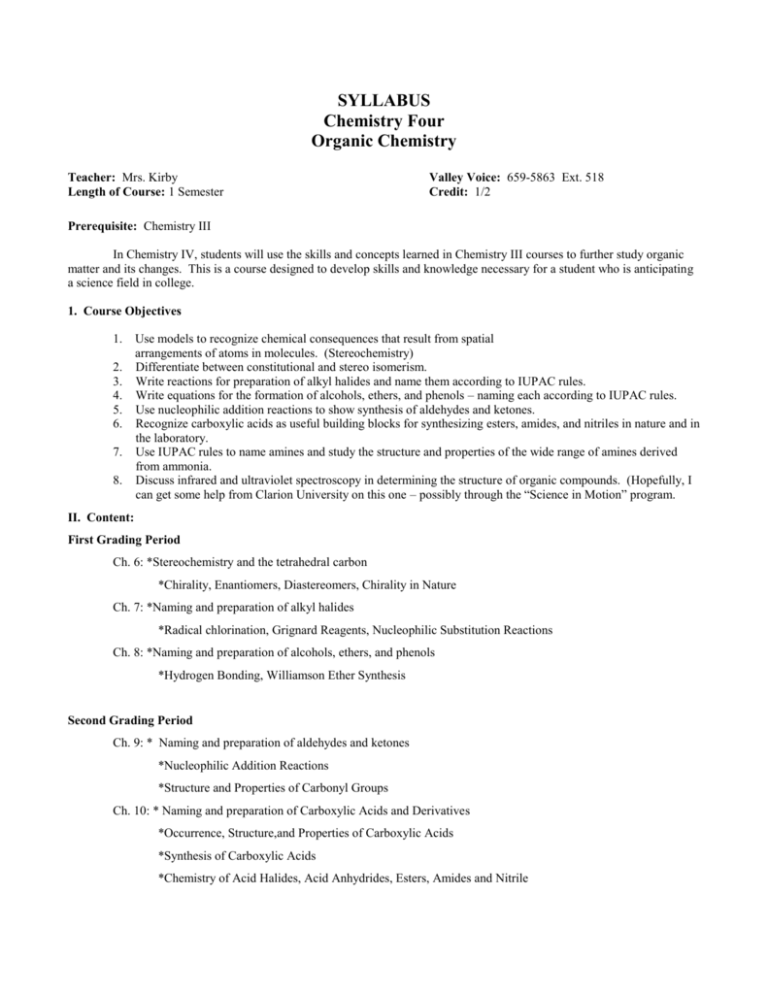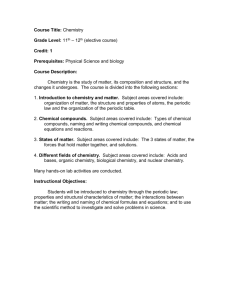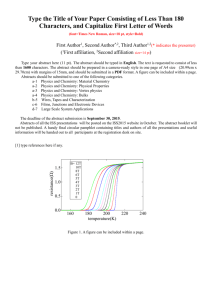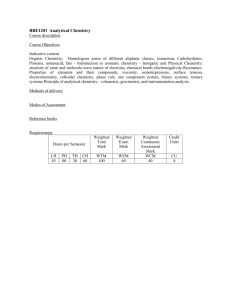Chemistry IV Syllabus - Allegheny
advertisement

SYLLABUS Chemistry Four Organic Chemistry Teacher: Mrs. Kirby Length of Course: 1 Semester Valley Voice: 659-5863 Ext. 518 Credit: 1/2 Prerequisite: Chemistry III In Chemistry IV, students will use the skills and concepts learned in Chemistry III courses to further study organic matter and its changes. This is a course designed to develop skills and knowledge necessary for a student who is anticipating a science field in college. 1. Course Objectives 1. 2. 3. 4. 5. 6. 7. 8. Use models to recognize chemical consequences that result from spatial arrangements of atoms in molecules. (Stereochemistry) Differentiate between constitutional and stereo isomerism. Write reactions for preparation of alkyl halides and name them according to IUPAC rules. Write equations for the formation of alcohols, ethers, and phenols – naming each according to IUPAC rules. Use nucleophilic addition reactions to show synthesis of aldehydes and ketones. Recognize carboxylic acids as useful building blocks for synthesizing esters, amides, and nitriles in nature and in the laboratory. Use IUPAC rules to name amines and study the structure and properties of the wide range of amines derived from ammonia. Discuss infrared and ultraviolet spectroscopy in determining the structure of organic compounds. (Hopefully, I can get some help from Clarion University on this one – possibly through the “Science in Motion” program. II. Content: First Grading Period Ch. 6: *Stereochemistry and the tetrahedral carbon *Chirality, Enantiomers, Diastereomers, Chirality in Nature Ch. 7: *Naming and preparation of alkyl halides *Radical chlorination, Grignard Reagents, Nucleophilic Substitution Reactions Ch. 8: *Naming and preparation of alcohols, ethers, and phenols *Hydrogen Bonding, Williamson Ether Synthesis Second Grading Period Ch. 9: * Naming and preparation of aldehydes and ketones *Nucleophilic Addition Reactions *Structure and Properties of Carbonyl Groups Ch. 10: * Naming and preparation of Carboxylic Acids and Derivatives *Occurrence, Structure,and Properties of Carboxylic Acids *Synthesis of Carboxylic Acids *Chemistry of Acid Halides, Acid Anhydrides, Esters, Amides and Nitrile III. MATERIALS A. Fundamentals of Organic Chemistry by Fessinger and Fessenger, 1994 B. Modern Chemistry by Holt, Rinehart, and Winston, 2009 C. Laser Disc, Overhead Transparencies, Study Guides that correlate with text D. Video Tapes, Charts, and Supplemental Material E. Smart Board / Document Camera IV. EXPECTED LEVELS OF ACHIEVEMENT A. The student is expected to score 65% or higher on teacher-prepared tests, lab reports, homework, and procedures. B. Students will be expected to participate in all classroom and laboratory activities. V. METHODS OF EVALUATION: A. Oral: Quizzes, Laboratory Activities, Classroom Participation, and Guided Practice. B. Written: Student Projects, Reports, Homework, Activity sheets, Tests and Quizzes for each Unit. VI. Grade Percentage Distribution Tests and Quizzes Homework and Projects Classroom Participation Lab Reports and Notebooks 1. 2. 3. 4. 45% 25% 10% 20% Chemistry Classroom Rules: Always bring your text book, notebooks, a pencil and a pen to class No horseplay in the lab or classroom, EVER!! No talking during instructional time in the classroom. On days when we don’t have a lab, DO NOT TOUCH the water or gas fixtures. Participation Points: Fifty participation points are given to each student at the beginning of each grading period. You will lose points for such behaviors as: breaking any classroom rules, needing to go back to your locker for something you have forgotten, and breaking rules on the lab safety contract. Points are deducted at my discretion. These points are not earned. They are given to you and it’s your job to hang on to them. Homework and Notebooks: Homework is not optional! Students will receive a zero if homework is not turned in on time. Homework must still be completed even if the student receives a zero. Participation points will be removed for each day homework remains uncompleted or for not writing assignments in the log. Taking notes is not optional. Participation points will be removed for refusal to take notes. Notebooks will be graded weekly. All hand-outs, worksheets, study guides, and etc. are to be in order and bound in a 3-ring binder. I will provide 3-ring hole punches. Notes are to be taken on notebook paper and included in the binder. Points will be deducted for loose papers in text books or notebooks. Students are required to have a scientific calculator and a pencil along with their binders and text books each day in class. Formal Lab Reports: Formal Lab Reports: You must have your pre-lab completed before coming to class on the day of a lab. If your pre-lab is not completed you must complete it in class before beginning the lab and you will receive no more than 1/2 credit for your lab. Formal Lab reports must be typed and handed in on the date they are due. Students will receive a zero if lab report is not turned in on time. Any graphs or tables must also be done on the computer. I will teach you how to do this. I expect full sentences and will deduct points for spelling and grammatical errors.








